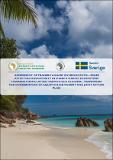| dc.description.abstract | The assessment points that The African Continent is home to large marine ecosystems with abundant biodiversity and natural beauty, but they are under immense threat from human activities. In some coastal states, biodiversity-derived services contribute more than 50% of the gross domestic product. The decline and loss of biodiversity are reducing nature's contributions to people in Africa, affecting daily lives and hampering sustainable social and economic development. Many African countries have developed national biodiversity strategies and action plans, but implementation has lagged due to constraints such as finance and capacity. Human-induced factors such as climate change, unsustainable exploitation of marine resources, pollution, habitat degradation, water quality deterioration, alien invasive species, population pressure, uncontrolled urbanization, and ineffective governance are negatively impacting African marine ecosystems. High ocean temperatures will have tremendous impacts on biodiversity, including fish stocks' abundance, composition, distribution, and availability. Weak governance at all levels, often characterized by overlapping jurisdictions, institutional failures, and lack of transparency, undermines biodiversity conservation and sustainable use. Improved coordination between national institutions responsible for multilateral environmental agreements and relevant ministerial departments and agencies is critical to synergizing biodiversity and ecosystem services management strategies within a multi-layer governance system. | en |
